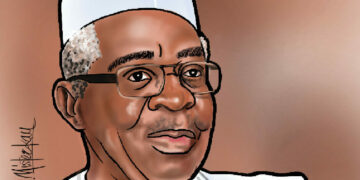If you ever ventured near the World Headquarters Shrine of the Palmwine Drinkers Club at the University of Ife of yore, you would hear the constant refrain:
Things fall apart, the centre must hold;
A house divided against itself shall stand;
Few are called, many are chosen…
In the midst of all the light-heartedness for which that club is known, what is embedded in the philosophy underpinning its chants, songs and pulsating beats can only be described as joyful optimism. The glass may be half empty but the story is not complete if we fail to acknowledge the fact that it is also half full. A story is only half told if it addresses only one side of the societal coin. At first, it may all look funny, but when we look deeply, we realise that what appears to harm us on one hand may be bringing beatitudes on the other.
That is the lesson that our very own internationally acclaimed documentary filmmaker, Collins Akpapunam, taught the world in 2024. Before his intervention, it was fashionable to address the brain drain phenomenon in which thousands of qualified professionals and artisans in all fields of human endeavour migrate to Europe and America in search of better working and living conditions. The mass exodus is popularly tagged “Japa” and is the sing-song of the youths and the not-so-young.
But Akpapunam draws our attention to the other side of the trend: Japa embodies the seeds of return or Japada. You could put it this way: He who japas will eventually japada. The initial loss of the professionals to foreign lands becomes a blessing when we consider the economic fallouts of their sojourn and how that is an unquantifiable blessing to the society from whence the pilgrims emerged.
The Drain
The premiere of Japa at the Main Auditorium of the United Nations House, Abuja, attracted the cream of the local gentry, bureaucrats, “culturepreneurs” and members of the diplomatic corps. The film brought together both the “losers” and the “beneficiaries” of the Japa syndrome. Without being offensive or rude, the film makes the point that migration happens because the system where the migrant is migrating from is faulty, unfriendly or too stultifying.
Laurent M.J. de Boeck, Chief of Mission of the International Organisation for Migration (IOM) to Nigeria said, “This is a great moment for us all. And I thank the producers of this documentary for using this opportunity to redraw our attention to migration. It will reopen discussions on this issue. It is almost turning into a pandemic and the world has to sit up by addressing the concerns raised in this film. But as it is, the issue at home is just to see a way to engage, enable and empower the Diaspora. In it all, we think about human mobility.”
Boeck whose organisation is an organ of the UN also believes that through brain drain those who have left these shores can constantly remit money home to reduce poverty and agony. Large remittance has a direct impact on Nigeria’s economic growth and advancement. It must be noted, though, that as African nations lose their best brains on a daily basis, so do they also lose their chance for speedy development. Boeck advocates a well-structured harnessing of the situation because the Diaspora are the best suited now to transfer technology, increase social capital and make life better. That is how brain drain can be turned into brain gain.
He insists that migration to foreign lands should not necessarily entail abandonment: “You might not necessarily return home completely. But if the atmosphere is conducive you can come and re-invest. Leaving Nigeria therefore does not mean abandoning Nigeria. No. Migration in itself is not a bad idea. What we are saying is that the government has to be proactive and involved in such a way to assist those who wish to return home to invest to do so more conveniently.”
Brain Drain, the documentary, featured in this year’s New York film festival and the silicon African Film festival in San Jose, California.
Akpapunam and his Efizzi Communications also make the point that when, on the one hand, you subject Japa to the crucible of analysis, you must, on the other hand, do the same to Japada in order to achieve a balance. Thus the need for a sequel.
The Gain
In “Brain Gain” which addresses the Japada imperative, Akpapunam shifts emphasis from loss to gain. He probed the transformative impact of Nigerian immigrants on their home country. Journalist Alhumphrey Amayenabo, in his brilliant review, wrote: “Through compelling storytelling and rigorous research, Collins Akpapunam demonstrates how Nigerian immigrants are leveraging their international experience, networks, and expertise to create jobs, stimulate investment, and foster development. From technology and healthcare to education and the arts, “Brain Gain” showcases the diverse ways in which the Diaspora is giving back to Nigeria.”
The beauty of Akpapunam’s documentaries is that they humanise the statistics, putting faces to stories, and names to achievements with the impact to the larger society, for good or for ill, as the ultimate consideration.
Chinua Achebe warned us to always strive to tell our own stories because “Until the lion learns how to write every story will glorify the hunter”. Thanks to Akpapunam and Efizzi for telling what is essentially an African story from our own perspective and proffering suggestions on how what is perceived as a curse can be transformed into a blessing.
Blessed Are The Givers
It could have happened to anybody. No public-spirited person would wish the recipients of his/her philanthropy dead. When a stampede ensues as desperate people attempt to force their way into the venue or forcefully grab items which they could otherwise have collected gracefully in an orderly atmosphere, we must temper our anger at the needless loss of lives with a charitable flavour. I join the nation in praying for the sweet repose of the souls of all the departed.
To heap all the blame for such tragedies at the doorsteps of the philanthropists appears cruel because that would be tantamount to making them reap the very opposite of the appreciation that would have been their just payback. It is easy to pontificate on how the philanthropists involved in the recent fatal stampedes in Ibadan, Okija and Abuja failed to ensure adequate security to prevent the stampedes.
The first question some perceptive people asked was, “Where were the police?”
If the events had been about convening an unauthorised radical political gathering, the police would have shown up whether they were invited or not. They would have scattered the gathering. But who cares about the poor? Now, the police are strutting all over the place when they, indeed, should join the organisers of those tragic events in the dock.
Looking back, I should thank God that I have been exposed to crowd control in the university through student unionism. My decision to feed 500 children of the IDP Camp near Games Village, Abuja in 2016, could also have ended tragically if we hadn’t secured the use of the premises of St. Christopher’s Catholic Church, Kaura, and pre-packed the food and drinks to make distribution seamless.
Suppose something had gone wrong? My associates and I would have spent all that money only to buy dormitory spaces in the penitentiary. No, that is not a good way to end the “movie”. I say blessed, indeed, are the givers.




